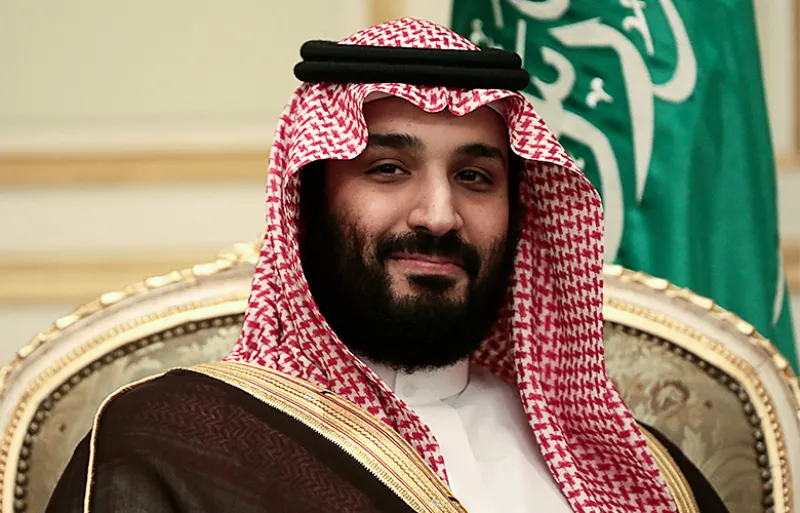After hosting a huge global conference of financial market leaders last month at the Ritz Carlton hotel in Riyadh to promote his ambitious economic agenda, Saudi Arabia’s Crown Prince Mohammed bin Salman bin Abdulaziz al-Saud made headlines again over the weekend when he summarily ordered the detention of dozens of princes, ministers and other senior government officials. The arrests were described as part of a new anti-corruption agenda, but the reality is more nuanced — and the scale of the purge hints at the likelihood that the crown prince’s father, King Salman bin Abdulaziz al-Saud, 81, may soon abdicate the throne in favor of his brash 32-year-old son.
The arrests apparently came without warning. On Saturday evening, King Salman decreed the creation of an anti-corruption committee chaired by the crown prince, who is known by his initials, MBS. Within hours, according to state-owned television network Al Arabiya, the committee detained least 11 princes, including the billionaire venture capitalist Prince al-Waleed bin Talal, owner of the investment firm Kingdom Holding, and Prince Miteb bin Abdullah, the head of the National Guard, as well as numerous ministers. The highest-ranking detainees are reportedly being held at the Ritz-Carlton, where — in late October — 3,500 invitees from around the world, including BlackRock CEO Larry Fink and IMF Managing Director Christine Lagarde, gathered to discuss Saudi Arabia’s ambitious economic development program, known as Vision 2030.
Although this weekend’s ministerial roundup came as a surprise to the financial community, it wasn’t the first such event in 2017: In September, Saudi authorities arrested more than 30 clerics, intellectuals, and activists in a coordinated crackdown on dissent. Although the detainees from this weekend’s purge were higher-profile, the political impetus behind the arrests is likely the same, say emerging-markets professionals.
“We definitely see it as a move to consolidate power ahead of an early abdication by the King in favor of MBS,” said an emerging-markets expert who declined to speak on the record due to the sensitivity of the situation. “Like most of these events, it’s about a lot of things — there’s a whole list of domestic and geopolitical issues in play, including hostilities with Yemen and the standoff with Qatar — but first and foremost it appears to be a shift to consolidate power because many of MBS’s initiatives are problematic for the powers-that-be in Saudi Arabia.”
[II Deep Dive: How Prince Mohammed Aims to Wean Saudi Arabia Off of Oil]
Just how problematic? The crown prince has literally set the stage for economic and social transformation in Saudi Arabia over the coming 15 years. At last month’s global financial conference, the Future Investment Initiative, MBS took to the podium in his role as chairman of the Public Investment Fund (PIF), Saudi Arabia’s $224 billion sovereign wealth fund, to showcase the kingdom’s ambitious plans to move away from its dependence on oil revenue.
In timed sequence with the huge event, PIF made a series of announcements about major new projects — most notably the government’s plans to create a sprawling 13,000 square-mile special economic zone, known as NEOM, overlooking the Red Sea. Such efforts will inevitably require co-investment capital and direct engagement from an array of global peers and asset managers: NEOM alone is estimated to require at least $500 billion.
In that context, the crown prince’s push to clear up corruption could be seen as a potential positive, signaling that any shady business within Saudi Arabia will not be tolerated. But the style of the arrests didn’t instill much confidence in the rule of law: Allegations were not supported by specific charges; no list of detainees was immediately made available.
“If you want to address corruption, you might want to develop a well-thought-out policy first, and implement it through the appropriate institutions,” says Sven Behrendt, founder and managing director of GeoEconomica, a political risk research and advisory firm based in Geneva. “But to do it in one blow and take these people out of their offices and put them in the Ritz-Carlton? I’m not sure that that’s something that [anti-corrpution organization] Transparency International would like to see.”
The crown prince’s ambitions extend far beyond mere economic and financial reforms, however. In a recent interview with The Guardian on October 24, MBS also revealed his ambitions to return Saudi Arabia to “moderate Islam.” In a country with a disproportionately young population — 70 percent of the population is under 30 years of age, and unemployment is running at approximately 12 percent, according to a report by the IMF — economic growth and the provision of new opportunities for young Saudis is critical to the country’s future political stability, on which the young prince depends.
The conundrum of the MBS’s liberalizing ambitions, however, is that he feels compelled to weed out any political opposition before starting to implement some of his most ambitious plans. At the moment, it’s hard to tell whether this latest decision will strengthen his hand or weaken it, given the scope of the ambitious proposals that he has put forward. But it has clarified the ranks of his enemies at home — and that he has high-level opponents. The political fabric of Saudi Arabia “has long been based on consensus,” observes Behrendt, “and this move certainly represents a sharp deviation from that underlying philosophy.”






